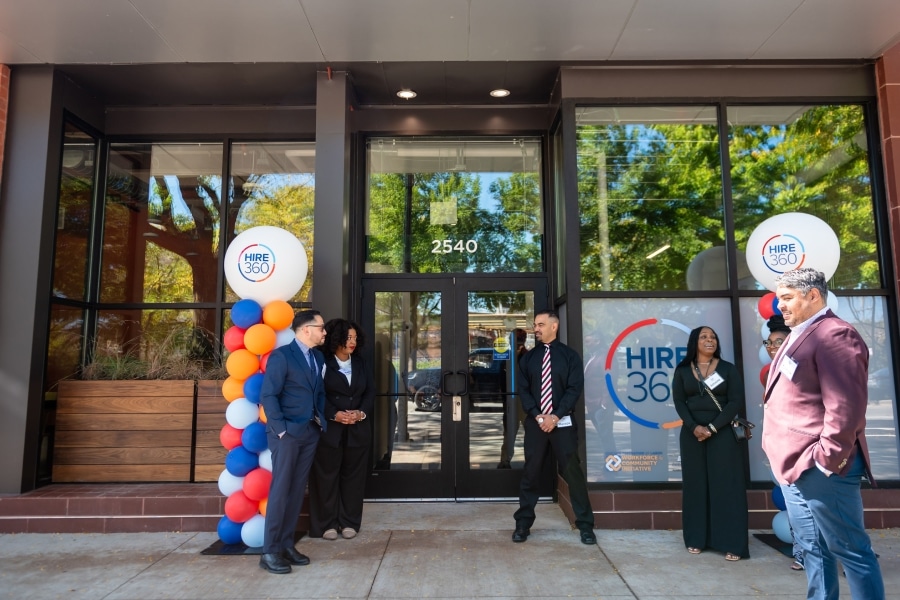Before Tim Clemmons earned a civil engineering degree and started working as an estimator for Chicago-based McHugh Construction, he was a young Marine assigned to 2nd Battalion, 5th Marines, Fox Company.
“2/5,” as it’s known, saw combat in every war in the past century and deployed to support Operation Iraqi Freedom and the War on Terror. It’s the most decorated battalion in the Marine Corps. Its motto, “Retreat, Hell!” comes from the trenches of World War I, when a French officer advised Marine officer Lloyd W. Williams to retreat. Williams’ reply: “Retreat? Hell, we just got here!”
When you speak with Clemmons, you get the feeling he has adopted those words as a personal mantra.
The Marine mindset
Born and raised on the South Side of Chicago, Clemmons wasn’t sure of his purpose after high school. For two years, he studied history in community college. But with the attacks of September 11, 2001, still fresh—and inspired by his older brother’s Marine Corps graduation—he joined in December 2004.
From boot camp in San Diego, Clemmons went on to basic training and then Infantry School in Camp Pendleton, California. Clemmons trained to be a rifleman, learning land navigation, basic first-aid and various maneuvers. Once he reached his unit—2nd Battalion, 5th Marines, Fox Company—a mindset to perform every job in every situation to the best of his ability became ingrained.

Clemmons’ first deployment was with the Marine Expeditionary Unit, the smallest air-ground task force in the U.S. Fleet Marine Force. As an expeditionary quick reaction force, this unit is ready for immediate response to any crisis, from natural disaster to combat mission.
His next deployment took him to Iraq, sparking an interest in Middle East politics and history that continues to this day. “As a kid growing up on the South Side of Chicago, you’re not exposed to that,” Clemmons said. “So, I wanted to soak up all the information I could.”
When his first contract ended, Clemmons re-enlisted and moved to Parris Island, South Carolina. There he joined the small craft section, ensuring civilian boats stayed out of restricted areas during firing on the rifle range.
During his next assignment—in 3rd Battalion, 6th Marines—he served as a squad leader. The training was a build-up for a deployment in Afghanistan, sending Clemmons back to the Middle East.
After eight years, Clemmons faced a tough decision. With the country transitioning to peacetime status, he wasn’t sure he still belonged in the Marines. Assessing the mental and physical toll the military had taken on him, Clemmons was honorably discharged in March 2013.
Life on the outside
Clemmons had already decided to return to school but had to wait six months. After discussing options with a friend who’d earned an electrical engineering degree, Clemmons decided to become a civil engineer.
The process, however, took almost six years—but, in keeping with the 2/5 mantra, retreat wasn’t an option.
Clemmons had to change majors and then learn math from the basics through differential equations. He also took physics and chemistry—all coursework required in the civil engineering program.
Clemmons also had to apply to schools with a civil engineering program. He eventually settled on the Illinois Institute of Technology. “It seemed like a long shot because I didn’t have the necessary transfer credits,” he recalled. “I was playing catchup, but that drove me even more.”
A South Side heritage
For three summers, Clemmons interned with McHugh Construction in Chicago. From a look at the company’s history, it’s clear Clemmons belonged there. James McHugh, an Irish bricklayer who, like Clemmons, hailed from the South Side of Chicago, founded the company in 1897.
But as Clemmons approached graduation in March 2020, the COVID-19 pandemic hit. Learning went from in-person to online, and thoughts of walking across a stage to get his diploma vanished.
When McHugh hired Clemmons as an estimator, he was 36 years old. Once again, he felt like he was playing catchup. But the work ethic he’s had all his life—and which was sharpened in the Marines—kicked in.
“A good work ethic goes a very long way,” Clemmons said. “When I started working full time, I decided immediately I needed to absorb as much as I can.”
His military experience also paid off.
“Each person in the military has a job, but they’re always working together as a team to achieve a common goal,” Clemmons explained. “So you see what a well-oiled machine can do.”
“That’s the same at McHugh,” he continued. “Everyone has a different method to achieve a goal, different backgrounds, different work histories. But like the Marines, it’s improvise, adapt and overcome.”
As an estimator, Clemmons works in the pre-construction group, helping McHugh formulate a game plan for projects slated for competitive bidding. “The end state is to deliver budget to the ownership that they’re happy with,” Clemmons said.
To shorten the learning curve when taking on a new job, Clemmons recommends finding competent, knowledgeable people and picking their brain. “Try to figure out problems on your own first but—when you’ve exhausted all options—find out what others would do.”
One person who provides invaluable advice to Clemmons is his wife, Lindsay. “She’s one of the most professional people I’ve ever met,” he said. “I’ve used her as a resource to help guide me along.” Early in 2021, the couple added a daughter, Hannah, to their family.
An untapped resource
Clemmons is passionate about the need for resources to help personnel transition from military to civilian life.
“When you’re in the military, on active duty, you live that life for 24 hours a day,” Clemmons said. “They train you to fit the ideal image they’re looking for. But it’s difficult to switch off that mentality when you move from the military to the civilian world and realize, ‘I’m not Sgt. Clemmons anymore.’”
Clemmons had a plan, but many veterans don’t. And trying to relate to civilians who didn’t live the military life for four years or longer can be difficult.
To help veterans, Clemmons suggested an outreach network that would help them navigate the path to solid employment, whether that’s in the trades or professional positions.
“Military veterans are used to the kind of organization you find in construction, the different groups and skill sets,” he said. “They understand working together to accomplish a goal. For the construction industry, they represent an untapped resource.”











